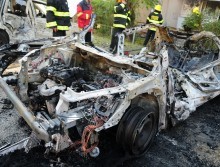
Iran may make threats against Israel on a regular basis, but the Jewish State takes them seriously—as they should—and Israel’s National Security Council is particularly concerned about the latest boasts of revenge coming from Tehran. The Israeli NSC last week issued a terror warning specifically calling out the danger posed by Iran following accusations by Iranian leaders that Israel is behind the assassination of a well-known Iranian nuclear scientist.
“In light of the threats that have been made recently by Iranian elements and given the past involvement of Iranian elements in terrorist attacks in various countries, there is concern that Iran will try to act in this manner against Israeli targets,” said the NSC press release. The Israeli security council said that “possible arenas” for an Iranian attack included both countries close to Iran—naming Georgia, Azerbaijan, Turkey, the United Arab Emirates (UAE), Bahrain and the Kurdish area in Iraq as examples—in addition to the rest of the Middle East and Africa.
While the NSC did not call out any specific country as a higher threat than another, the UAE and Bahrain were already in the news for their recent peace deals signed with Israel in the Abraham Accords. Therefore, they may have already been targets by Iran and their terrorist allies.
The Israeli security warning follows multiple high-level threats issued by Iranian officials in the wake of the assassination of nuclear scientist Mohsen Fakhrizadeh. The scientist Fakhrizadeh has long been in the news: Israel highlighted him as a key member of Iran’s efforts to develop nuclear weapons when discussing the treasure trove of Iranian nuclear records captured several years ago.
Now, Iranian officials have accused Israel of killing Fakhrizadeh, according to a report by the Fars News Agency, noting that Iran’s government spokesman and multiple leaders have warned of retaliation. Commander of the Islamic Revolution Guards Corps (IRGC) Major General Hossein Salami was quoted by Fars as threatening “harsh revenge and punishment” and even the supposedly moderate President Hasan Rouhani said Iran would respond.
Iranian Government Spokesman Ali Rabiyee was quoted by Fars as saying that those behind the killing would “pay the price but in a place, time and method that we choose” and that “a response should… give a response to their attacks.”
Iran has engaged in shocking acts of state-sponsored terrorism via the Hezbollah terror group in past years, including attacks on Israelis in Europe and South America. Iran has even attacked Israel directly in recent years from their military units stationed in Syria.
Meanwhile, while Iran is the most visible threat to Israelis abroad, the Israeli NSC warning didn’t stop with vengeance from Tehran. Other dangers include the ISIS terror organization and other global jihadist groups, with the NSC highlighting the terrorists have already recently launched attacks in France, Austria and Germany. “Calls have been made by global jihadist elements for attacks on Israelis and Jews,” said the NSC statement. “It is possible that part of the current wave of Islamist terrorism will reach targets identified with Israel or Jewish communities, synagogues, kosher restaurants and Jewish museums.”
Christian holidays around the Christmas season could also “attract hostile terrorist activity in Europe,” according to the NSC.
In response to these dangers, the NSC advises Israelis traveling overseas to check for travel warnings for specific locations. In general, Israeli travellers should also “show heightened awareness (including in proximity to Israeli missions, synagogues and Jewish community institutions), listen to the security directives of the local authorities, keep distant from crowded areas and refrain from congregating in public areas that are not secured or are in proximity to government institutions.”
(By Joshua Spurlock, www.themideastupdate.com, December 6, 2020)
